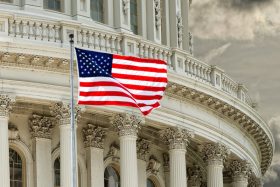
The potential size and scope of future federal spending bills to bolster the economy, especially an infrastructure measure, would have important implications for the industrials sector.
After passing the Tax Cuts and Jobs Act, President Donald Trump issued an infrastructure agenda that never resulted in legislation. Should he win re-election, Trump could push for a package targeting surface transportation improvements—measures to repair roads and bridges—along with airports and other critical infrastructure. Democratic candidate and former vice-president Joe Biden, by contrast, has called for an ambitious plan to fund traditional infrastructure projects, while also investing heavily in clean power and energy efficiency.
If implemented, Biden’s expansive plans could accelerate the push for energy efficiency and reductions in greenhouse gas emissions—a secular trend that would affect companies specializing in air compressors, rail, commercial aircraft, electric vehicles and industrial gases.
The ultimate shape of either candidate’s infrastructure plan would depend heavily on the balance of power in the Senate.
Regardless of which candidate wins the presidential election, some type of infrastructure bill is likely—which could be a boost to machinery and construction companies.
The next president’s trade policies would also have important implications for industrials companies, which typically sell their products overseas and operate global supply chains. Both candidates have espoused a tough approach to China, though their strategies and goals would differ.
During his first term, Trump’s push to narrow the U.S. trade deficit through punitive tariffs created higher uncertainty, regulatory scrutiny, and costs for industrials with multinational operations. Trade tensions with China likely would intensify if the Republicans were to win re-election. At the same time, Trump might also seek to redefine trade relations between the U.S. and European Union, potentially increasing the risk of further tariffs.
All signs suggest that, as president, Biden would also take a tough stance toward China on market practices and human rights issues, though he would likely seek multilateral partnerships and engage levers beyond trade in any renegotiation of the U.S.‑China relationship.
Further, the challenges the U.S. faced in sourcing personal protective equipment and other critical medical equipment during the coronavirus pandemic demonstrated the country’s need for secure and readily accessible supplies in the event of a crisis. These concerns about supply chain security could buttress the Trump administration’s efforts to encourage the reshoring of American industry through tax credits and tariffs. Initial efforts would likely focus on targeted health care and technology supply chains, but could extend to critical technologies in the industrials sector. Biden, too, has voiced support for onshoring strategically critical American industries.
On the environmental regulation front, President Trump’s deregulation efforts have removed and weakened environmental rules, lessening compliance costs for some U.S. manufacturing and heavy industry companies. This trend is likely to continue if he were to secure another term.
On the other hand, a Biden administration would seek to strengthen environmental regulations, likely making them even stricter than those implemented under former President Barack Obama.
Trade and environmental policies bear watching, but the size and specifics of any federal spending package would determine the likelihood of future inflationary pressures as well as the segments of the industrials sector that could benefit the most.
Katie Deal is an analyst in the U.S. Equity Division of T. Rowe Price. These views are those of the author and not necessarily those of the Canadian Investment Review.
